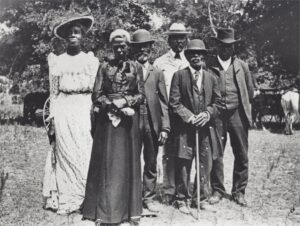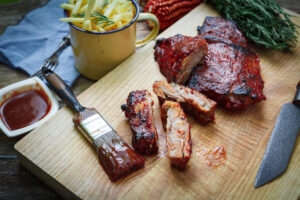features
Juneteenth: Why eating red foods is so important to Black Americans
17 Jun 2022
6m
When it comes to marking historical events, there’s no denying that food plays a very important role. It cements traditions, it’s steeped in symbolism and the very act of cooking and eating can be seen to honour generations gone by.
Perhaps no holiday exemplifies this quite as well as Juneteenth – a date which is widely honoured by Black Americans today, to commemorate when around 250,000 enslaved people from Galveston, Texas were truly freed.

Juneteenth emancipation day celebrations in Texas back in 1900 (Credit: Alamy)
Many slave owners had refused to accept the Emancipation Proclamation for two and a half years before this monumental date in 1865, so the arrival of union troops marked a new chapter on June 19th, thus triggering the annual celebration we know today.
For decades, people have marked Juneteenth by reading Emancipation Proclamation in full and singing a selection of patriotic and religious songs. But now, perhaps the most common way to honour the occasion is through the consumption of food and drink with red hues, like red soda, watermelon and barbecue dishes.
To dig into why Juneteenth foods are red and how have the traditions have stood the test of time, Twisted spoke to award-winning American culinary historian and author of Soul Food: The Surprising Story of an American Cuisine, Adrian Miller.

The sticky red glaze on barbecued meat has become symbolic (Credit: Alamy)
What red food and drinks are traditional on Juneteenth?
As with all food traditions, the red food and drink consumed over Juneteenth has evolved as the years have gone by.
“One of the earliest ancestral drinks would have been red kola nut tea. Kola nuts are native to Africa, and the red ones, you would just put it in some water, sweeten to taste and serve,” says Miller. “The other one would be hibiscus based drinks. They go by several names in West Africa but bissap is the most common, and again, it’s just the red flower petals of the hibiscus plant – the one that’s native to West Africa – steeped in water and sweetened.”
The ingredients for both of these drinks came across the Atlantic during the slave trade and subsequently took root, meaning they were commonly consumed by many of those Juneteenth seeks to honour. Whilst the ingredients are less accessible today in the American South, due to the climate, Miller says there’s still a strong emphasis on people creating drinks that are coloured red.
“In the earliest emancipation celebrations that I could see in the 1870s and 80s, red lemonade was one of the most popular drinks – that’s before the advent of red carbonated beverages (strawberry soda, cherry soda) and later, Big Red Soda and KoolAid, which you typically see people drinking today.”

Red drinks are consumed to honour ancestral traditions (Credit: Alamy)
Alongside red drinks, Miller says there are two other components that make up the “Juneteenth trinity” – barbecue foods and watermelon.
“When you smoke meat, it has a reddish tinge…it’s called the smoke ring, and even though it looks brown on the outside, when you cut it, it’s got this reddish, pinkish inside,” Miller says. “Then, of course, the application of a tomato based barbecue sauce also accentuates the red factor”.
On top of its colour, the historian says that barbecue food became part of the traditions for two simple reasons: the fact it’s a summer celebration, and the sheer amount of people it can serve.
“In the early days, barbecue was all about digging a pit in the ground and cooking whole animals, and it could feed a whole community,” he explains. “The food barbecued varies, some parts of Texas traditionally cooked goat, others would cook hog and beef would also be common.”

American BBQ food has become an integral part of Juneteenth (Credit: Unsplash)
Previously, Juneteenth also saw Black Americans eating fried chicken in a browny/red fried crumb, and of late the Juneteenth Trinity has been expanded to include a plethora more options, like vegan alternatives and healthier riffs on the classics.
For dessert, watermelon has always been customary, but recently, other red foods like red velvet cake and strawberry pie have also entered the mix. They’re not traditional, but culinary tropes evolve, and the idea remains the same.
“There’s no doubt whatever red food you eat or drink, it’s still an intentional, symbolic decision,” Miller says.
The history of Juneteenth’s red food tradition
But what is red symbolising? According to the historian, “the idea is that the colour red symbolises the bloodshed of enslaved Africans,” and acts as a tribute to those who suffered in the slave trade.
There are several other theories behind the use of red foods, too.
“Another explanation that I’ve heard is that a red was a royal colour for several West African courts,” he adds, whilst Fred Opie, a history professor at Babson College, has previously attributed the colour red to the sacred tradition of “offering up the blood of animals,” which is traced back to the Yoruba and Asante tribes.
Culinary historian Michael Twitty has his own theory, suggesting that the colour red symbolises transition and power for the Yoruba and Kongo tribes.
“Enslavement narratives from Texas recall an African ancestor being lured using red flannel cloth, and many of the charms and power objects used to manipulate invisible forces required a red handkerchief,” he says.

Watermelon is also typically eaten over Juneteenth (Credit: Unsplash)
Whichever of these theories is true, they’re all in keeping with the fact that, as well as a celebration, Juneteenth is a deeply “spiritual practice”, in which those observing can come together as a community to signify their continued fight for equality and freedom in society.
Miller says that, in this instance, the power of food and drink to bring people together can’t be underplayed. In fact, it’s a big part of why Juneteenth celebrations have stood the test of time, and become such an institution (in 2021, it was even made a federal holiday).
“The interesting thing is, there were traditions of celebrating emancipation in other places, but Juneteenth is the one that has had longevity across the US,” he adds. “One of the remarkable stories of Juneteenth is how it’s supplanted all of these other local traditions and became the celebration it is today”.
The emotional significance of food on Juneteenth
There are many reasons Juneteenth’s food and drink has connected with Black Americans on such a scale.
For one, Miller says, “barbecue is definitely about celebration, building community and reinforcing social ties, and it’s something that’s a deep tradition within Black community.”
Through the process of cooking and eating barbecue foods, “you feel like you’re communicating with the ancestors, not only with the folks you know in the present day,” he adds. “You’re steeped in a deep tradition that goes way back.
“There’s a reason when you look at just records of the African experience in the Americas, barbecue shows up all over the place.”

Sharing barbecue food is spiritual for many Black Americans (Credit: Unsplash)
The tradition of eating red foods as a whole also leaves an impact, whether people are consciously aware of it or not.
“There is a spiritual dimension to it because you are linked in this common enterprise, which is racial justice,” Miller says.
“You’re in the midst of this really strange situation where you’re in a country where you’re not yet fully accepted, but you’re trying to find a space where you can still celebrate the small victories and the things that make you human.
“I don’t know if people are readily conscious of it, but even today it’s certainly a part of what’s going on.”
Miller admits that he does worry people are becoming less aware of the significance of the red foods they eat on Juneteenth, and what they stand for.
“As well as celebrating freedom, we’re also giving a nod to the horrific things that our ancestors went through,” he says. “It’s a testament to our strength that we are still surviving despite everything that’s been thrown at us
“The important thing to remember is that Juneteenth is not the final word on freedom because we’re not yet free.”



.jpg_dU0O4c?tr=w-2560,f-webp,q-70)